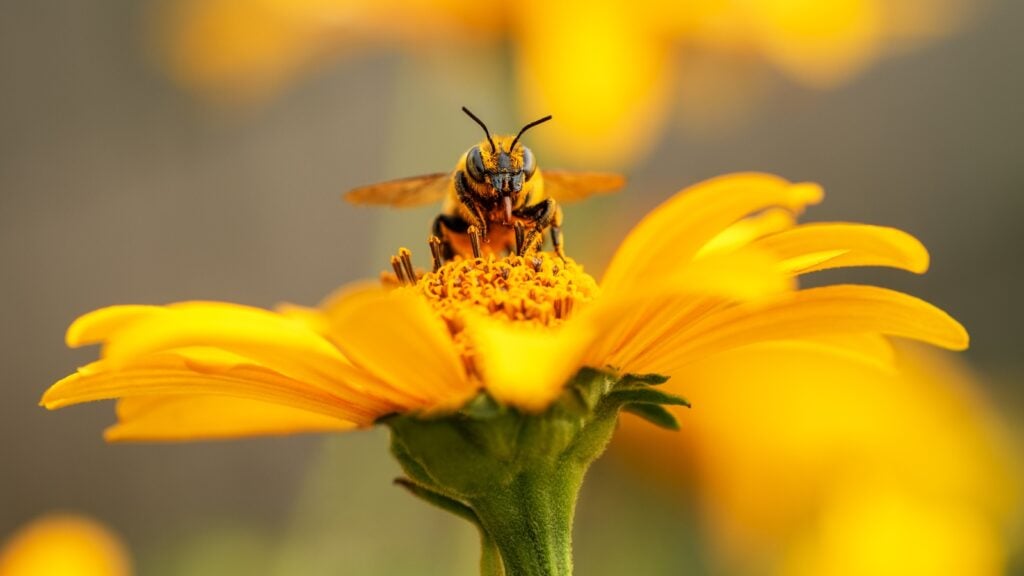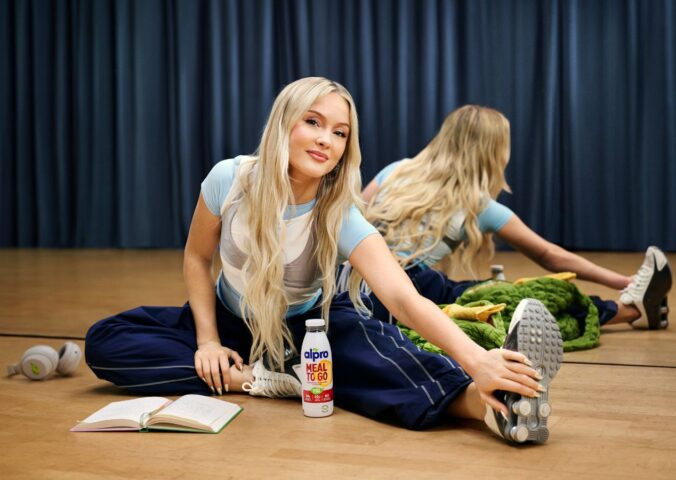If you take a walk around Manchester, one of the UK’s biggest northern cities, you’ll notice bees everywhere. Not just in real life, in parks and gardens, but symbolically too: in graffiti art, on benches, buildings, bollards, and even trash cans.
Adopted as the city’s emblem more than a century ago, the humble worker bee (which is the smallest of all honey bees and is always female) is seen by many Mancunians as representative of their key values. After all, bees work hard, they work together, they produce value.
The city of Manchester isn’t alone. Humans have had a relationship with bees for centuries. The Ancient Egyptians felt they had religious and spiritual significance, while many 19th-century Europeans felt superstitious about them. The age-old ritual of “telling the bees,” for example, saw people inform bees about the death of loved ones. (If they didn’t, they feared they would suffer more loss.)
Fast forward to 2023, and we still have a special relationship with bees. But it’s not just about spirituality and superstition. We need them to survive.
Bees are responsible for pollinating our food supply. In fact, one in every three bites of food we take can be attributed to bees. They also offer invaluable support to ecosystems, helping plants and trees grow. In Europe, bees pollinate around 80 percent of wildflowers.
But bees are in decline. And, despite how much we have always revered them, most of that is humanity’s fault.
Pesticides’ impact on bees
One of the biggest threats to bees is our incessant use of pesticides.
Used by farmers, the blanket term “pesticides” refers to chemical sprays, treatments, and pellets used for pest, weed, and fungus control.
In 2012, first-of-its-kind research discovered that these chemicals were causing a serious decline of honey bees in both the US and the UK. It’s not surprising: many of these chemicals are designed to kill insects – and, spoiler alert, bees are insects.
Ten years on, pesticides are still presenting a huge problem for bees. Earlier this month, another study from the University of Oxford found that they impact bee nervous systems, interfering with their coordination and effectively making the insects appear “drunk.”
“Our results are reason for concern because the ability of bees to respond appropriately to visual information is crucial for their flight and navigation,” said lead author Dr. Rachel Parkinson. “And thus their survival.”
Pollution and habitat loss
But pesticides are just one of the many enormous problems bees are up against. Air pollution is another huge factor in bee decline. One recent study, conducted over a period of three years, predicted that in India, pollution could kill off honey bees entirely.
The study focused on bees in Bengaluru, one of the country’s most polluted cities. It found the insects covered in “all sorts of crud and particles,” researcher Geetha Thimmegowda told Science. Some even had traces of toxic heavy metals, like arsenic and lead. The study found that out of every five bees that collected pollen from the most polluted areas in the city, four died within one day of collection.
And as well as pollution, among many other issues, bees are facing habitat loss too. As reported by Friends of the Earth, since World War II, the UK has lost 97 percent of its wildflower meadows to things like intensive farming and urban development.
“It’s more essential than ever that new urban development such as housing avoids damage to important habitats, like the remaining wildflower meadows,” states the nonprofit. “What’s more it must also incorporate ‘green infrastructure’ that can significantly benefit bees and other wildlife.”
How to help the bees
Ultimately, a lot of effective bee protection comes down to legislation. Earlier this year, the Wildlife Trusts reported that the UK government was putting bees at risk by allowing for the use of thiamethoxam, a previously banned bee-harming pesticide.
At the time, Matt Shardlow, the CEO of insect charity Buglife, said: “It is shameful that no action has been taken to ensure that bee and wildlife destroying pesticides are properly assessed as being pollinator safe before they are approved or derogated for use.”
Joan Edwards of the Wildlife Trusts added: “It’s a clear betrayal of promises made to protect the natural world and comes at a time when nature declines are worse than ever.”
But despite government failures, there are things we can all do to help our bee populations. Here are just a handful of the actions that we can take to do our part for these valuable pollinators.
1. Create a bee-friendly garden
If you have a garden or any form of outside space, it is possible to make it more appealing to bees.
Firstly, think about the sort of flowers you plant. Bees like those that are rich in pollen and nectar, like lavender and vipers bugloss, for example. You can also buy wildflower seed bombs, which contain a mix of nectar-rich wildflowers. Simply throw them into your garden and wait for the meadow to bloom.
You could also make or buy a bee hotel, which consists of small hollow cavities for bees to shelter and nest inside.
Finally, avoid harmful chemicals. To get rid of weeds, opt for methods like pulling by hand or pouring boiling water. If you want to use killer, only use it at night, when bees are not out foraging in your garden. You can also find options that are more bee-friendly. Spectracide Weed Stop For Lawns, for example, is atrazine-based, which means it’s less harmful to bees.
2. Opt for vegan honey
While humans love honey (the global market is worth more than $8 billion), bees don’t actually produce it for us to add to smoothies and enjoy on toast. They need it for themselves: it provides them with a valuable source of nutrition throughout the winter.
But there is a way to have honey without taking it from the bees. Vegan honey is becoming more widely available. UK-based brand The Vegan Honey, for example, makes cruelty-free, plant-based, gluten-free honey using fruit sugar and fruit juice.
Other brands include Honea, which also uses sugar and fruit juice to create a honey-like substance that looks and tastes like the real thing, and Coconut Merchant, which creates vegan honey using pure coconut nectar.
3. Keep an eye out for tired bees, and help them
Bees have busy lives, and like us, they get tired. This is more common in built-up areas, where there are fewer flowers and plants to stop and refuel at before they make it back to the hive.
If you’re concerned for a tired bee, you can help revive them with sugar water. But it must be done carefully. Sugar solution is a one-time fix for one tired bee. Leaving it out in the garden all the time could actually do more harm than good.
Beevive, a bee protection brand launched in 2019, explains: “Unlike nutritious pollen and nectar, this solution will not feed the bee larvae properly and can also cultivate bacteria over time. Putting these out for bees will teach them to go there and leave the flowers unpollinated.”
But as a one-off to save a bee in need, sugar water may do the trick. Simply get a spoon and leave the solution (two tablespoons of white sugar to one tablespoon of water) next to the exhausted bee.
Alternatively, you can buy sugar water accessories to keep on your keys so you’re always prepared. Those in the UK can get 10 percent off their very own Bee Revival Kit on the Beevive website – just use the code PBNEWS at checkout. (If you live outside of the UK, you can find the product on Etsy.) Beevive also offers bee hotels and seed balls, and has a wealth of information about bees available on its website.
4. Buy local, organic produce
As we’ve already established, pesticides are the enemy of bees. To avoid produce that has been sprayed with chemicals, choose to buy local, organic fruit and vegetables. (Or grow your own!)
According to the Soil Association, organic food is produced without pesticides, which isn’t just better for bees, but it’s better for us too.
The organization notes: “Scientists increasingly believe there is no safe level of pesticides for humans to be exposed to. Even tiny amounts that the Government currently consider are safe, could be damaging to human health.”
Find out more about pesticide use in farming here.
5. Support bee conservation efforts
The bees need all the support they can get. And thankfully, there are several organizations dedicated to helping with their conservation.
If you have the means, donating to organizations like the Soil Association, Friends of the Earth, the Wildlife Trusts, Buglife, and the Bumblee Conservation Trust is an important way to ensure these precious insects are getting the help they need.
—
If you purchase something through a link on our site, Plant Based News may earn a commission, which helps us to provide our free services to millions of people each week.






